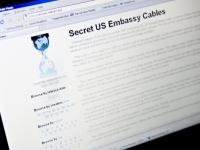[MUSIC UP AND UNDER]
BOB GARFIELD: From WNYC in New York, this is On the Media. I'm Bob Garfield.
BROOKE GLADSTONE: And I'm Brooke Gladstone.
[MUSIC] Since posting a quarter million diplomatic cables last weekend, WikiLeaks has struggled to stay online. It’s been taken down intermittently by denial of service attacks, which a hacker called The Jester has taken credit for. On Thursday, Amazon.com removed the website from its servers, denying it was pressured by the government to do so, explaining that WikiLeaks had violated its terms of services. As of Friday, the website was back up at Wikileaks.ch, posted by an information freedom group called the Swiss Pirate Party. But if the past week is any indicator, there’s no telling where the website will be by the time you hear this. Meanwhile, the highlights of the latest document dump orchestrated by WikiLeaks founder Julian Assange, which have appeared in Britain’s Guardian newspaper, France’s Le Monde, Germany’s Der Spiegel, Spain’s El Pais and The New York Times, have enraged such legislators as Joe Lieberman, Lindsey Graham and Peter King.
[CLIP]:
JOE LIEBERMAN: He’s a menace.
FEMALE CORRESPONDENT: Well, is that -
JOE LIEBERMAN: And he’s - in my opinion he’s risked lives.
[END CLIP]
[CLIP]:
LINDSEY GRAHAM: Well, I agree with the Pentagon’s assessment that the people at WikiLeaks could have - blood on their hands.
[END CLIP]
[CLIP]:
PETER KING: I have called on the Attorney General Eric Holder to immediately begin prosecution of WikiLeaks for violating the Espionage Act.
[END CLIP]
BROOKE GLADSTONE: On Thursday, Senators John Ensign, Scott Brown and Joe Lieberman introduced the so-called “SHIELD Act” to expand the World War I era Espionage Act. Currently, it protects signal and satellite intelligence and cryptography. The SHIELD Act would cover human intelligence, as well. Senator Ensign said in a statement, quote, “Our sources are bravely risking their lives when they stand up against the tyranny of Al-Qaeda, the Taliban and murderous regimes, and I simply will not stand idly by as they become death targets because of Julian Assange.” Some say the cables, which offer everything from snarky assessments of foreign leaders by U.S. diplomats to secret negotiations among heads of state in regional hotspots, are a game changer. Others say, not so much.
DEFENSE SECRETARY ROBERT GATES: The fact is governments deal with the United States because it’s in their interest, not because they like us, not because they trust us and not because they believe we can keep secrets.
BROOKE GLADSTONE: U.S. Defense Secretary Robert Gates.
DEFENSE SECRETARY ROBERT GATES: Some governments deal with us because they fear us, some because they respect us, most because they need us. So other nations will continue to deal with us. Is this embarrassing? Yes. Is it awkward? Yes. The consequences for U.S. foreign policy? I think fairly modest.
BROOKE GLADSTONE: In fact, Kim Philby, who spied for the Soviets during the hottest period of the Cold War, observed in his 1968 book, My Silent War, that secret documents, though glamorous, are frequently a snare and a delusion. Quote, “Is it a first draft, a second draft or the finished memorandum? Was it written by an official of standing, or some dogsbody with a bright idea? Even if it is unmistakably a direct instruction to the United States Ambassador from the Secretary of State dated last Tuesday, is it still valid today? In short, documentary intelligence, to be really valuable, must come as a steady stream, embellished with an awful lot of explanatory annotation.” Philby concluded, “An hour’s serious discussion with a trustworthy informant is often more valuable than any number of original documents.” In response to the developments of Wednesday and Thursday, WikiLeaks tweeted a link to a video posted on YouTube of excerpts from a speech by President John F. Kennedy in 1961 decrying government secrecy.
[CLIP]:
PRESIDENT JOHN F. KENNEDY: We decided long ago that the dangers of excessive and unwarranted concealment of pertinent facts far outweighed the dangers which are cited to justify it.
[END CLIP]
BROOKE GLADSTONE: But in that same speech, Kennedy made this request:
[CLIP]:
PRESIDENT JOHN F. KENNEDY: But I do ask every publisher, every editor and every newsman in the nation to reexamine his own standards and to recognize the nature of our country’s peril. In time of war, the government and the press have customarily joined in an effort, based largely on self-discipline, to prevent unauthorized disclosures to the enemy.
[END CLIP]

